Account of the main events in the Israel-Hamas war and hostilities by the Iranian Axis
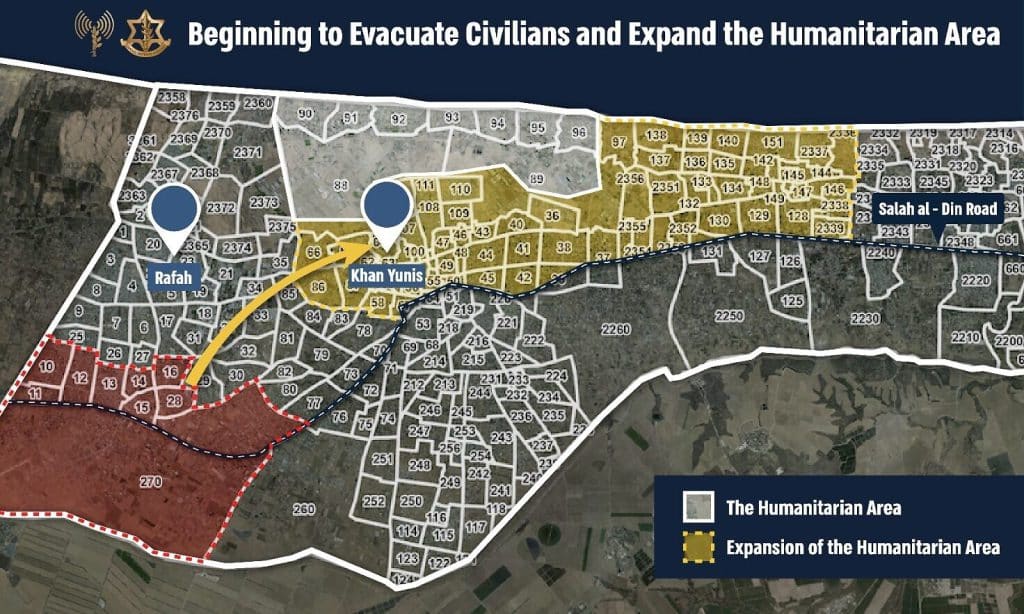
Overview
- Turkish President Erdogan announced that he plans to suspend trade with Israel until there is a permanent ceasefire and a continuous entrance of aid.
- Turkey’s Foreign Minister, Hakan Fidan, stated that Turkey would join South Africa’s genocide case against Israel at the International Court of Justice (ICJ).
- President of Colombia, Gustavo Petro announced that Colombia is severing diplomatic ties with Israel and joining the ICJ case against Israel.
- The Washington Post reported, that Secretary of State Antony Blinken advised Qatari Prime Minister, Mohammed bin Abdulrahman Al Thani to expel Hamas leadership from its territory if the terrorist organization continues to reject ceasefire proposals with Israel. It was also reported that Qatar has advised Hamas to make alternative residency plans should they need to leave as Qatar is reassessing its role as mediator and as a result may close Hamas’s political office in its capital, Doha.
- Erez crossing in Northern Gaza from which terrorists stormed to Israel on October 7th re-opened for the first time since the start of the war, with a record number of trucks crossing, including 30 from Jordan.
- World Central Kitchen NGO resumed operation on April 29th for the first time since the tragic incident in which 7 of its volunteers were accidentally killed by an IDF strike.
- Hamas leaders and Iranian leaders have praised the Pro-Palestinian demonstrators on US campuses and have even declared that they would be the next generation of American leaders.
- Egyptian officials and Israeli negotiators have been going back and forth between the two countries as CIA Director William Burns arrived in Cairo earlier in the week.
- The Wall Street Journal reported Friday that Israel had given Hamas one week to agree to the hostage deal on the table, or it would launch its long-pledged offensive in Gaza’s southernmost city.
- It was reported that France is trying to promote a ceasefire agreement between Israel and Hezbollah that would end the fight in the north in three stages and within 10 days while the terror organization and other armed groups would retreat 10 km north of the border. This is still not in compliance with UN Resolution 1701.
- Houthi leader Abdul Malik al-Houthi declared that they would not stop fighting Israel until it is destroyed and repeated his request that Saudi Arabia open a land passage for them to reach Israel.
International
- Turkish President Erdogan announced that he plans to suspend trade with Israel until there is a permanent ceasefire and a continuous entrance of aid. Trade with Turkey is significant as 20% of Israel’s oil coming from Azerbaijan travels through Turkey, as well as other imports for the construction sector. Israel imports over $5 Billion worth of goods from Turkey every year. This new measure could lead to a spike in prices as Israel scrabbles to find new sources for those goods. Israel created a team from various governmental agencies to draft an Israeli response which includes filing a complaint against Turkey to the Organization for Economic Co-operation and Development (OECD) and the World Trade Organization (WTO) for violating treaties as well as reducing imports to the PA (Turkey account for 18% of imports to the PA).
- In the Old City of Jerusalem, a Turkish tourist committed a terror attack against Israeli border patrol and was neutralized.
- Turkey’s Foreign Minister, Hakan Fidan, stated that Turkey would join South Africa’s genocide case against Israel at the International Court of Justice (ICJ).
- President of Colombia, Gustavo Petro announced that Colombia is severing diplomatic ties with Israel and joining the ICJ case against Israel.
- A senior Hamas official, Musa Abu Marzook, stated in an interview with an Iranian newspaper in Arabic that if the terrorist organization is expelled from Qatar, they will likely relocate to Jordan because most of their leadership has Jordanian citizenship or passports. Jordan said that they would not accept Hamas.
- In response to Nicaragua’s request to the ICJ to order Germany to halt military and other aid to Israel, the UN’s top court ruled against the request 15-1, but rejected Germany’s request to have the case dismissed altogether, as the Court expressed deep concern over the “catastrophic living conditions in Gaza.”
- The Washington Post reported, that Secretary of State Antony Blinken advised Qatari Prime Minister, Mohammed bin Abdulrahman Al Thani to expel Hamas leadership from its territory if the terrorist organization continues to reject ceasefire proposals with Israel. It was also reported that Qatar has advised Hamas to make alternative residency plans should they need to leave as Qatar is reassessing its role as mediator and as a result may close Hamas’s political office in its capital, Doha.
- Trinidad and Tobago has joined Barbados and Jamaica in recognizing the state of Palestine.
- The UK has imposed new sanctions on “extremist groups and individuals” for settler violence against Palestinians in the Judea and Samaria. The sanctioned individuals are Elisha Yered, Eden Levy, Neriah Ben Pazi, and Noam Federman, as well as the groups Lahava and Hilltop Youth. British Foreign Secretary David Cameron stated, “Extremist settlers are undermining security and stability and threatening the future prospects for peace.”
The “settler violence” topic has become increasingly outspoken by leaders in Western countries who are attempting to balance their support of Israel with counter-measures against it. One can recognize this trend in votes in the UN by the UK, France, and others in favor of an unconditional cease-fire; in the normalization of improper balance between Hamas’ sexual violence and claims on non-existent sexual abuse of Palestinians in Israeli prisons, with no evidence; and the balance of support of Israel’s right to defend itself with significant political pressure to compromise over its security, while pushing semantic terminology such as starvation, genocide, and occupation.
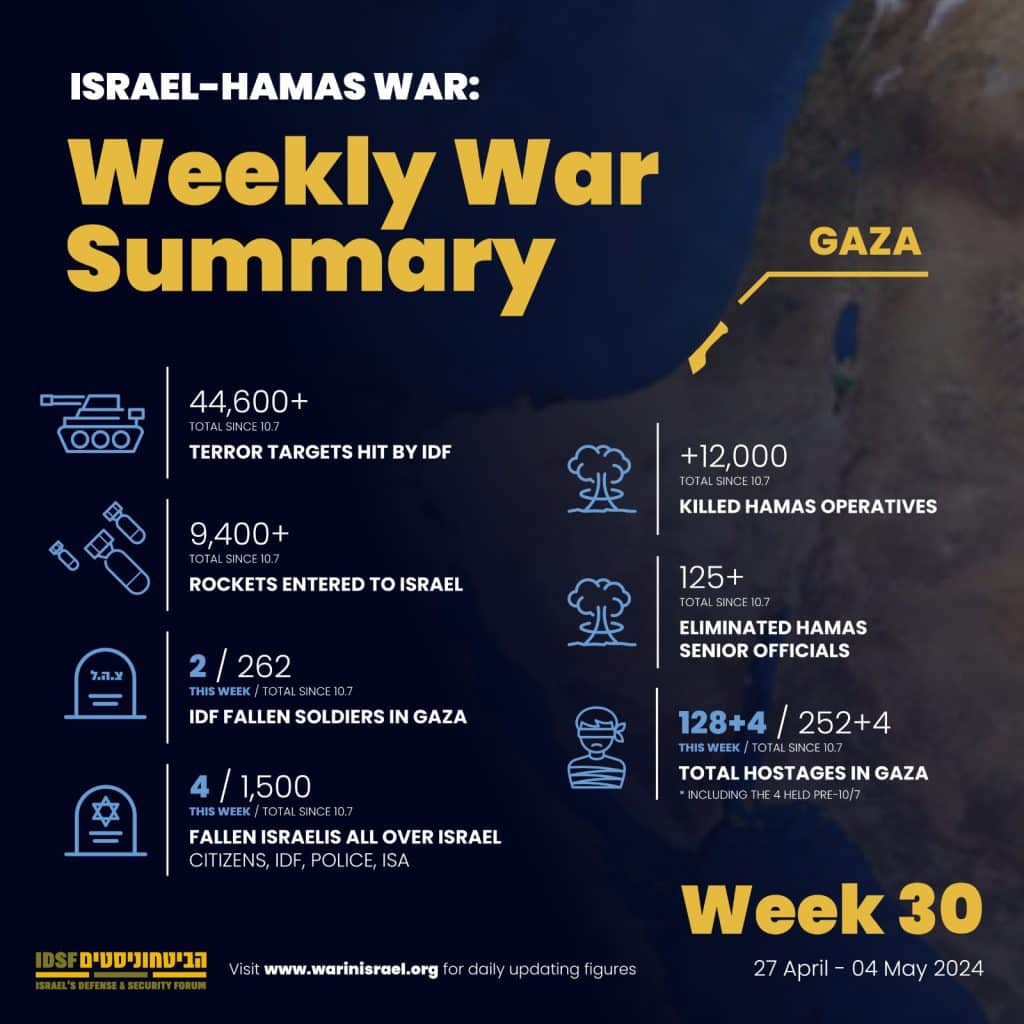
Gaza Strip
Diplomatic
US role in the war
Secretary Blinken traveled to both Israel and Saudi Arabia during his 7th visit to the region since the start of the war. In Saudi Arabia, Blinken referred to the pending hostage deal as “extraordinarily generous” on the part of Israel, and stated that Israel has made many concessions, while blaming Hamas for preventing the deal. He also mentioned that Israel is not yet ready for the operation in Rafah because it has not prepared the humanitarian infrastructure.
Humanitarian Aid
Blinken visited the Kerem Shalom crossing and the Port of Ashdod as part of his assessment of humanitarian aid capabilities and the overall Israeli plan to evacuate the civilian Rafah population.
Meanwhile, the Erez crossing in Northern Gaza from which terrorists stormed to Israel on October 7th re-opened for the first time since the start of the war, with a record number of trucks crossing, including 30 from Jordan. World Central Kitchen NGO resumed operation on April 29th for the first time since the tragic incident in which 7 of its volunteers were accidentally killed by an IDF strike.
The Popular Front for the Liberation of Palestine and another terror faction called the Popular Resistance Committees declared that they would attack any British ship or British forces operating off the coast of Gaza, after Britain offered to assist in the distribution of food through the American floating port being erected to facilitate humanitarian aid distribution. This statement came just days after Hamas declared that they would attack any food shipment from air, sea, or land that does not pass through the regular crossings under their supervision. Hamas’s statements make it clear that they view the distribution of humanitarian aid as a critical platform for them to control in order for them to re-establish their dominion over the Gaza population. The distribution of humanitarian aid by any other channel directly compromises their monopoly of aid distribution, and negates their ability to reestablish their control of the population. This makes Israel’s choice clear in instating temporary IDF control over the Gaza Strip and by extension handing out humanitarian aid, in order to neutralize one of Hamas’ strongest cards.
The IDF plans to send a brigade to secure the American pier from Hamas attacks. Preventing Hamas’s ability to disrupt and thereby control the flow of aid will be a critical part of the struggle for any new civilian administration in Gaza that will need to resist any remnant of Hamas’ ability to leverage control over the people of Gaza.

College Campuses
Hamas leaders and Iranian leaders have praised the Pro-Palestinian demonstrators on US campuses and have even declared that they would be the next generation of American leaders. Iran went as far as offering student visas to students who were to be expelled from campus. The protestors, many of whom have been trained by professional agitators (as uncovered by a WSJ article1) and are backed by Qatari funded organizations ‘based on various reports, aim to create a parallel between the anti-war protests, against the Vietnam War of 1968 and the current encampments on US campuses, as well as between the Palestinian cause and Nelson Mandela’s in South Africa. The Democratic Party convention which will renominate President Biden later this summer, will take place in the same city of Chicago that hosted the 1968 Democratic convention and is largely remembered for being over-run by radical anti-Vietnam war protesters. The potential for replaying that scenario remains a significant concern for Democratic Party officials, and partially led to the victory of Republican Richard Nixon.
President Biden gave an address, 9 days after the mass demonstrations at numerous universities began. While condemning violence and antisemitism, he used relatively mild language and created equivalence between antisemitism and Islamophobia on campuses, doing his best to avoid alienating the many progressive activists who are both heavily represented in the pro-Hamas, antisemitic protests and are critical Democratic constituency.
As a reaction to the violent antisemitic incidents on campuses, the US Congress passed a bill amending Title VI of the Civil Rights Act that included an adoption of the International Holocaust Remembrance Alliance working definition of antisemitism. This means that federal funds could be withheld from institutions that do not enforce sanctions on antisemitic agitators.
The Day After in Gaza
The Hamas Hostage Deal and Rafah Operation
It has been more 3 months since the Israeli government declared its intention to go on with the Rafah operation. The primary hold-up has been the insistence of the US to approve Israel’s plan for the safe evacuation of the civilian Rafah population. The IDF has expressed its eagerness to execute the operation and is waiting for the command from the War Cabinet. Meanwhile, Israel has passed the new operational plans to the US for examination. Blinken and other US officials have indicated that they have not seen a plan that would allow them to green light the operation and there are reports that the operation may be further delayed if there is progress with the hostage deal.
Egyptian officials and Israeli negotiators have been going back and forth between the two countries as CIA Director William Burns arrived in Cairo earlier in the week. Egypt has expanded its demands to include the removal of the Nezarim corridor separating southern Gaza and Northern Gaza, which was erected to prevent movement of terrorism and weapons, as part of the hostage deal.
A proposal for a two-stage deal is reportedly under consideration. Reportedly, in the first stage, between 20 to 33 hostages will be released, and for each citizen, 20 Palestinian terrorists in Israeli prisons would be released. This phase is supposed to last for 40 days. Afterwards, the ceasefire is supposed to last for a year, with Hamas demanding a commitment that Israel will withdraw from the strip and the war will cease. In the second stage, the soldiers held as hostages will be released, and for each one, 40 security prisoners are demanded, half of whom are terrorists with blood on their hands. However, Prime Minister Netanyahu flatly denied any reports on an Israeli concession to end the war, and senior Israeli officials rejected Hamas’ desire to see American guarantees for such an eventuality.
There are many news leaks concerning the negotiations on Arab media sites which could perhaps be a tactic used by Hamas to increase the pressure on Israel. According to reports, the negotiations are going well, and Hamas may have secured a guarantee from the US for a sustained ceasefire during the first stage which could be extended further and could de facto mean the end of the war.
Hamas appears to be creating the appearance that it may agree to the first stage of the truce, and continuously using the term “positive spirit” to characterize its current attitude. Taher Nunu, a Hamas official and advisor to Hamas chief Ismail Haniyeh, said the meetings in Cairo with Egyptian and Qatari mediators have begun and Hamas is dealing with their proposals “with full seriousness and responsibility.” He reiterates the terror group’s demand that any deal should include an Israeli pullout from Gaza and an end to the war, conditions that Israel has previously rejected. Citing unidentified sources, the Palestinian Al-Quds newspaper reported that American mediators had promised that Israel would completely withdraw from Gaza under the third and final phase, and the war would effectively end.
Subsequently, Israeli sources told the media that they would not agree to a truce if it included a guarantee to end the war.
The Wall Street Journal reported Friday that Israel had given Hamas one week to agree to the hostage deal on the table, or it would launch its long-pledged offensive in Gaza’s southernmost city.
Israel is no longer opposed to Hamas’s demand for the release of Fatah’s Marwan Barghouti as part of a hostages-for-truce, the London-based Asharq Al-Awsat reports, citing sources close to the negotiations. The report says that Israel is insisting that Barghouti go to Gaza rather than the Judea and Samaria if he is freed.
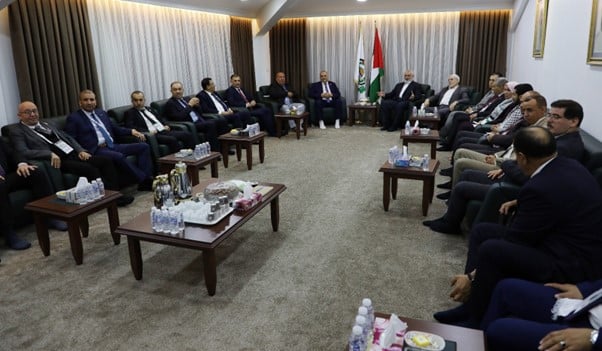
Hamas Diplomatic Efforts
Hamas is expanding its network of allies with a series of diplomatic visits by top Hamas officials over the past week:
- A delegation led by Musa Abu Marzook, held a series of consultations in Beijing with the Chinese Deputy Foreign Minister, Deng Li. The Chinese Deputy Foreign Minister expressed China’s firm stance regarding the Palestinian cause.
- Ismail Haniyeh met with Nkosi Zwelivelile Mandela, Nelson Mandela’s grandson in Istanbul. During the meeting, Haniyeh expressed his deep appreciation for South Africa’s position regarding bringing Israel to the ICC. Mandela expressed his pride in the Palestinian people’s resistance and emphasized that his country would continue to stand with the Palestinian people until the establishment of an independent Palestinian state with Jerusalem as its capital.
- Haniyeh met with several Jordanian parliament members in Istanbul. He stated that Jordan holds a special importance in the Palestinian issue and praised the solidarity from the Jordanian public, which confirms the “unity of the two peoples.”
- Haniyeh met with multiple party leaders in Turkey and with the former Prime Minister of Turkey and former Foreign Minister, Ahmet Davutoglu, who currently leads the “Future” party.
- Haniyeh met with the President of the Algerian Parliament, Ibrahim Boughali, and other parliament members.
The various meetings with Turkish party leaders and the fact that many other diplomatic visits have been held in Turkey might indicate that Hamas may relocate to Turkey even if Qatar does not explicitly expel them.

CENTCOM
Operational
- The Israeli Air Force targeted many targets throughout Gaza, including rocket launching positions or mortar fire, ammunition depots, and military buildings. It provided air cover to the fighters of Brigade 99 who are fighting in the center of the Strip, including neutralizing terrorists who tried to launch rockets at the fighters.
- Divisions 98 and 162 are preparing their equipment and mobilizing reserve fighters, in advance of the pending Rafah Operation. The reserve fighters of the division are undergoing training and customized professional development days at all levels; commanders are briefed while approving operational plans; and all equipment from tanks to armored personnel carriers are undergoing comprehensive repairs, including those damaged in battle, and are ready for use as if it were their first time.
- In Beit Hanoun, the IDF identified and destroyed two offensive tunnels and are searching for more underground infrastructures. This activity, alongside the latest rocket launches, demonstrate that Israel cannot allow the Rafah civilians to move back north where the terror has not yet been completely extinguished, and that its eradication could continue for many more months.
- Fighters of Division 99 are already in full activity along the Nezarim corridor axis, and Egypt is demanding the removal of the corridor as part of a ceasefire deal it is promoting as a last attempt to bring about a hostage deal and delay, if not prevent, the maneuver in Rafah.
Domestic Arena
Demonstrators gathered on Saturday evening at Democracy Square in Tel Aviv and at other locations around the country to protest against the government, call for early elections and the release of hostages held by Hamas, as reports suggest a truce deal may be looming.
- The IDF announced the promotion of 5 Generals as part of a series of appointments in the General Staff – a forum of senior commanders responsible for the various branches and departments of the military – including the next Head of Intelligence. Brigadier General Avi Blot who currently serves as the Head of the Command and Staff College would be appointed as the next chief of the Central Command. Brigadier General Shlomi Binder who currently serves as the Head of the Operations Divisions – under the Operations Directorate – would replace General Haliva as the next Head of Intelligence. This round of appointments was also taking hits, both from politicians and prominent military correspondents, for show a disconnect with the security apparatus’ crisis of trust with the public and the bad optics of appointing the next military staff prior to the inquiry into the October 7 scandal.
- Netanyahu is caught between conflicting pressures- if he agrees to the current hostage deal and gives up the Rafah operation, Smotrich and Ben Gvir are likely to leave the government. If he does not appear to agree to any hostage deal, Gantz may leave the government. It appears that the only way to progress is if there is some flexibility in the American position regarding the Rafah offensive and a realization that Hamas would only agree to a hostage deal that would cement its victory and control over the Gaza Strip.

Source: Iran in Arabic on telegram, t.me/Iran_Bel_Arabi
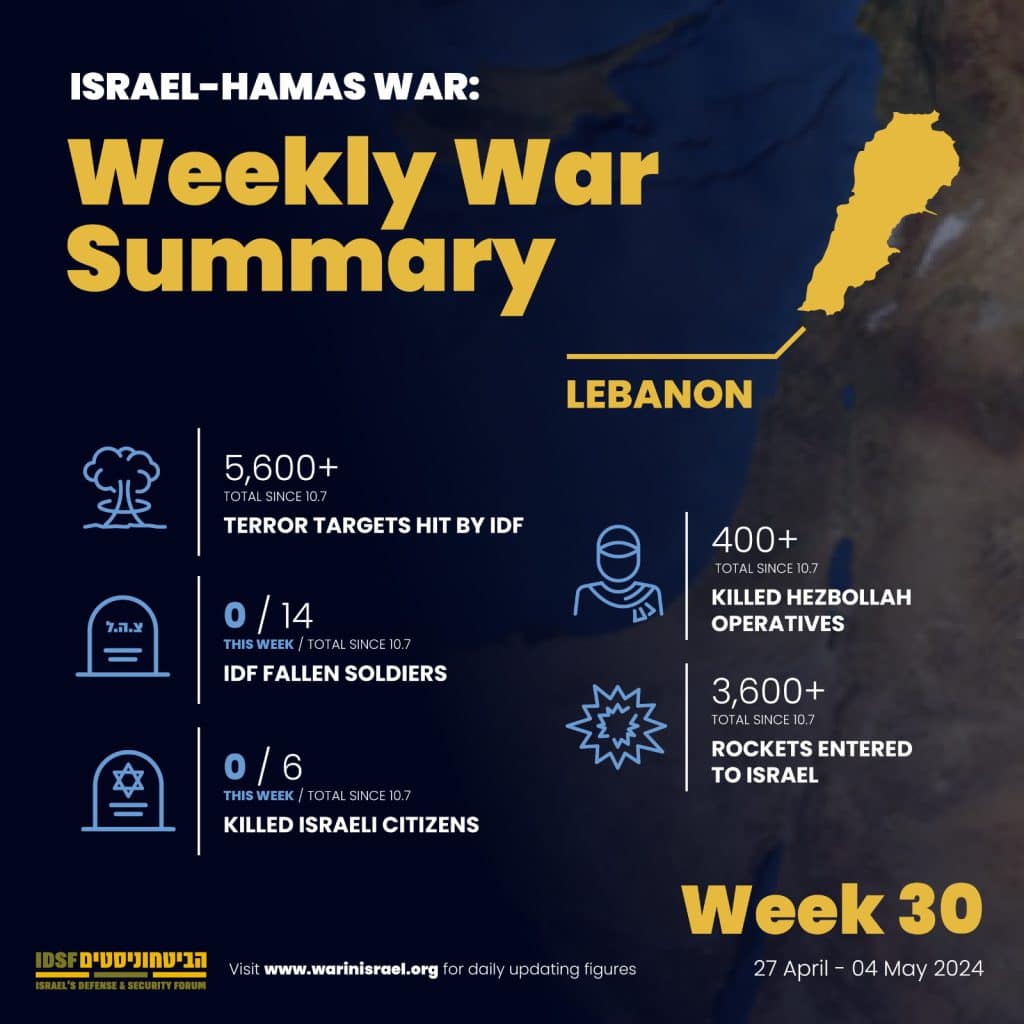
Lebanon
Operational
Hezbollah has secretly relocated the families of its senior members from Lebanon to safe places in Syria. About 700 families have been moved so far, most from border areas.
Diplomatic
- It was reported that France is trying to promote a ceasefire agreement between Israel and Hezbollah that would end the fight in the north in three stages and within 10 days while the terror organization and other armed groups would retreat 10 km north of the border. This is still not in compliance with UN Resolution 1701 which required a demilitarized zone from the Israeli border to the Litani River. The expectation is that France is pressuring Jerusalem and Beirut to enter negotiations on new border arrangements. The European Union commissioner visited Lebanon and committed to transferring one billion euros to the country to combat the illegal migration of Syrian refugees from the country to the EU territory, a significant economic step to sever ties between Lebanon and Iran on the way to what could be an agreement between Israel and Hezbollah.
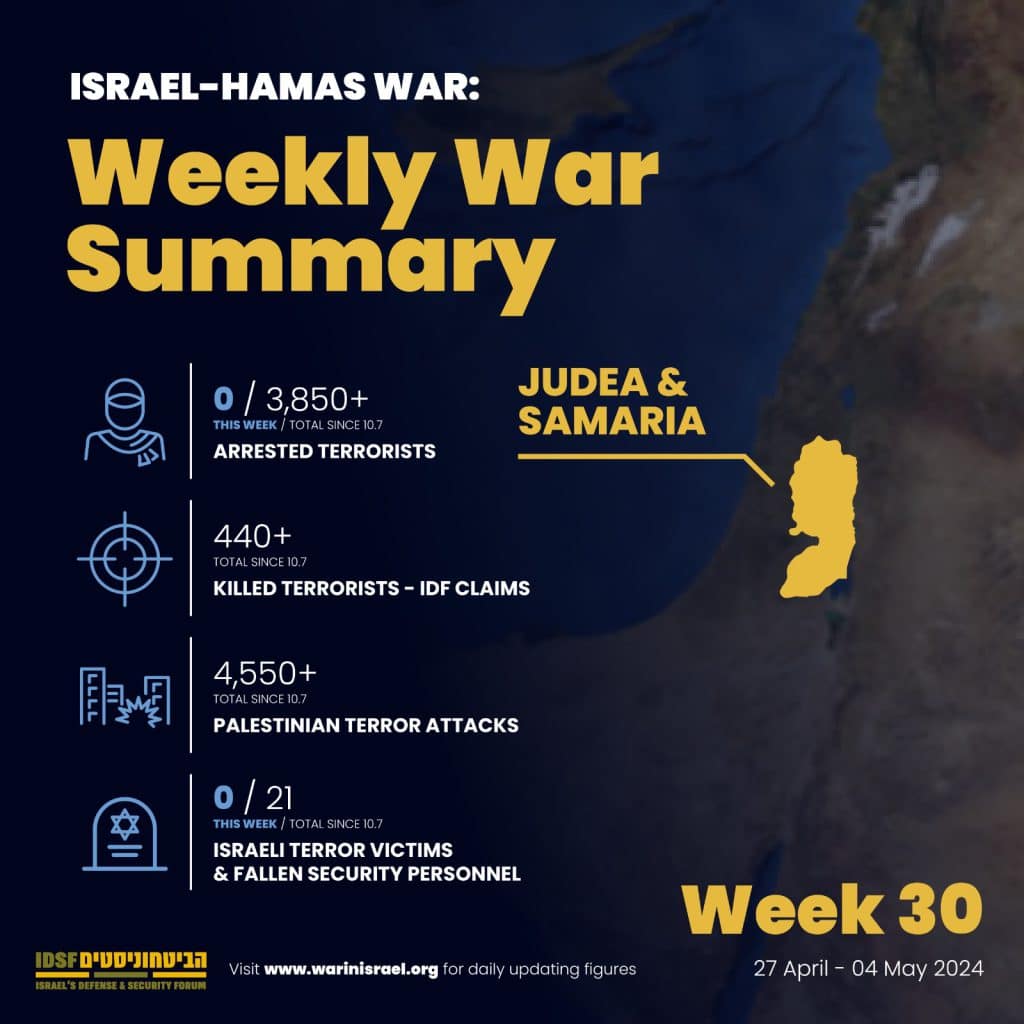
Judea and Samaria
- Since the start of the conflict, approximately 3,850 wanted individuals have been arrested across the Judea and Samaria Division and the Jordan Valley and Valleys Brigade; about 1,650 of them are affiliated with the Hamas terrorist organization.
- A Palestinian vehicle attempted to ram Border Police officers. There were no casualties, and the officers responded by firing at the vehicle. The assailant fled on foot, and a manhunt was initiated to capture him.
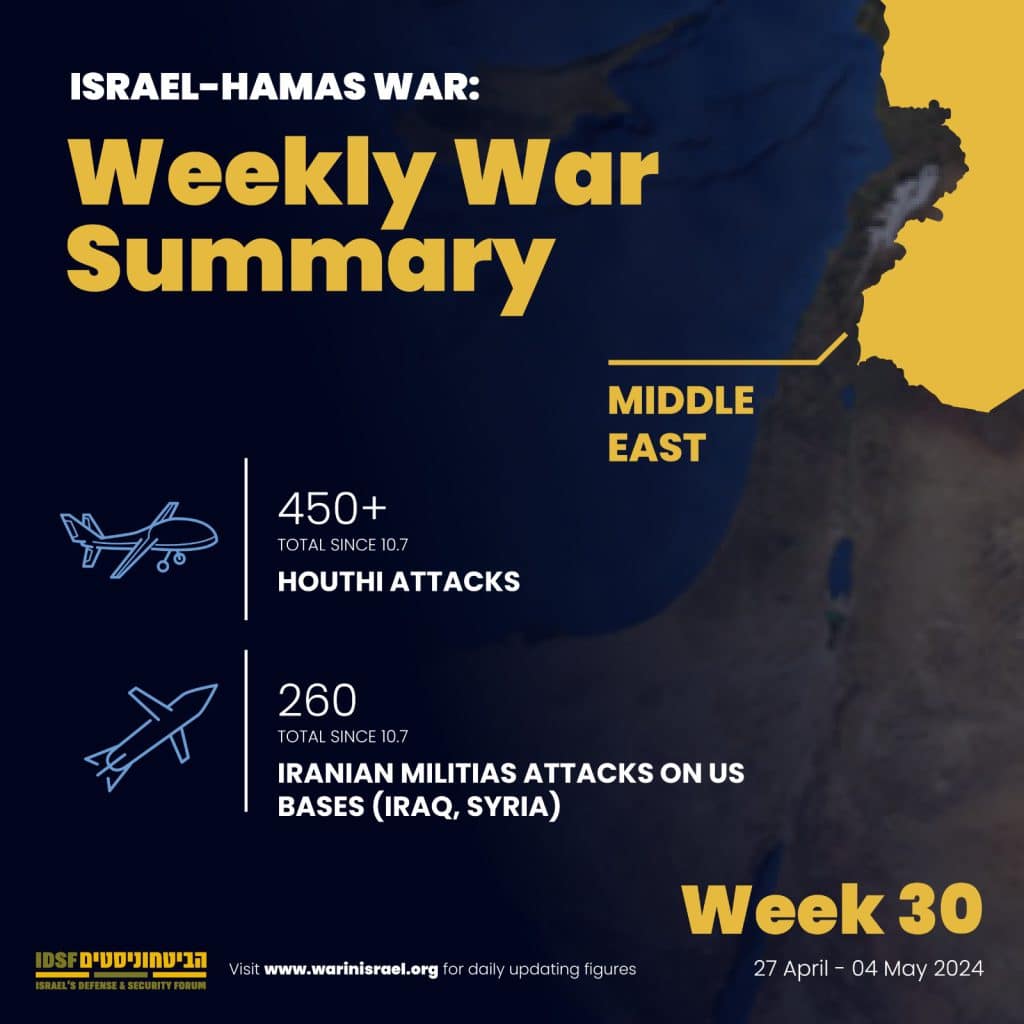
Iraq and Syria
- Israel has issued a direct threat to President Assad that Syrian territory must not be used as a platform from which Iran can act against Israel; otherwise, Israel will topple the regime.
- For the first time since the assassination of the Iranian General Zahedi: an attack attributed to Israel occurred in the Damascus area in Syria.
- Shia militias in Iraq, which have claimed responsibility for various actions, claimed to have launched cruise missiles towards Israel for the first time including towards Be’er Sheva, Tel Aviv and a “vital” target in the Dead Sea. There is no evidence of any attack.
Yemen
- The Houthis launched 3 missiles that caused minor damage to a ship sailing slightly north of Bab el Mandeb. CENTCOM shot down 5 Houthi UAVs, and the Italian Navy one UAV.
- A Shia militia from Bahrain called Sarayat al-Ashtar published a photo of a UAV launch that they claimed hit Eilat.
- Houthi leader Abdul Malik al-Houthi declared that they would not stop fighting Israel until it is destroyed and repeated his request that Saudi Arabia open a land passage for them to reach Israel.
- The Houthis have released footage from one of their attacks on a merchant ship using a UAV. The ship is “CYCLADES,” which was en route to Israel.
- According to reports, the Houthis are building huge tunnels in the mountains of Yemen for storing long-range ground-to-ground ballistic missiles. It has long been known that the Houthis, with Iranian help, built giant underground storage facilities; tunnel excavation began a year ago, and it seems that at least one tunnel has already been completed.
Iran
- Nasser Kanaani, the spokesperson for Iran’s Foreign Ministry, praised pro-Palestinian protests in the USA and Europe, and condemned the “suppression” of pro-Palestinian student protests in universities across the USA and Europe.
- Iran’s Foreign Minister, Hossein Amir Abdollahian, traveled to Gambia to participate in the 15th Islamic Cooperation Organization summit. At the summit in the capital Banjul, Abdollahian met with Egypt’s Foreign Minister, Sameh Shoukry, and Saudi Foreign Minister, Faisal bin Farhan.
- The Deputy Defense Minister of Azerbaijan, Lieutenant General Kerim Mustafayev, met with the Deputy Chief of General Staff of the Iranian Armed Forces, Brigadier General Aziz Nasirzadeh. During this meeting, they emphasized the importance of improving relations between the two nations’ military sectors in various domains. An Azerbaijani military delegation visited the 65th Division of Iran’s ground forces, including the Islamic Republic of Iran’s Army’s Special Airborne Forces. Azerbaijan has been a reliable Israeli ally and has largely been seen as bulwark against Iran.
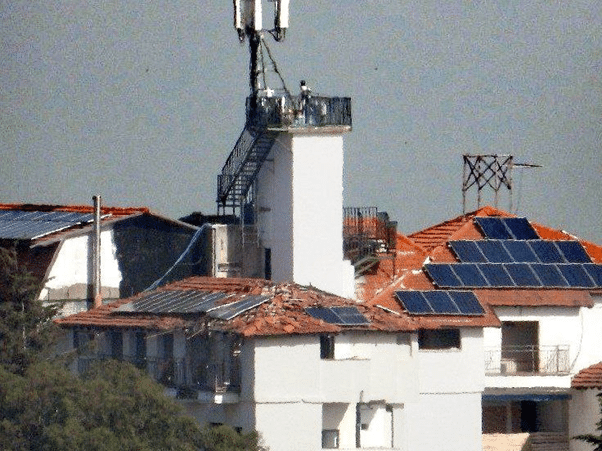
| Source: web.telegram.org/k/#@eretzh